Friday, December 15th 2017

Intel Looking to Increase Capacities of 900P SSD, According to Official Document
Intel seems to be looking to further expand its lineup of the 900P SSD, according to an official Intel document the folks at myce.com got access to. The file, a Product Change Notification (PCN), is usually used by Intel to denote revisions or new products for their manufacturing facilities. And the PCN 115990 - 00 lists increased capacities of 960 GB and 1,5 TB for their 900P SSD.
The newly listed products aren't the only things of note here, though. There have also been some label changes, and reduced voltages across the board. The retail box label will now also include the firmware version the unit ships with, which will definitely come in handy in case there is a known bad batch in these SSDs (as unlikely as that is to be).
Sources:
MYCE.com, via Tom's Hardware, Intel PCN PDF
The newly listed products aren't the only things of note here, though. There have also been some label changes, and reduced voltages across the board. The retail box label will now also include the firmware version the unit ships with, which will definitely come in handy in case there is a known bad batch in these SSDs (as unlikely as that is to be).
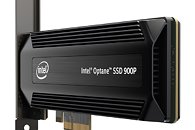
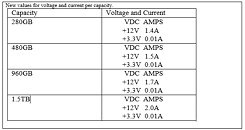
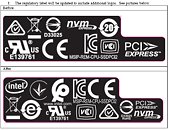
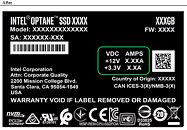
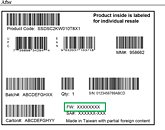
25 Comments on Intel Looking to Increase Capacities of 900P SSD, According to Official Document
Better come with another SC ship so that it's an adequate trade.
it is getting hard to keep track of the 100s or 1000s of different CPUs, SSDs, HDD, GPUs, and so on from cell phones, servers, computers, and so on so forgive me :/
I have binned desktops, servers, cellphones, nicnacks and so on. So hard to keep up lol
480GB 900p is 570€
XPoint is twice as expensive as NAND SSDs
and yes a hilartious and awesome song*...roccking out to some mead wine :D
What would be the most interesting thing is price drop for NVMe. If they can drop these to 600€ for 2TB (talking fastest models, not some bottom of barrel crap), it's gonna be hot stuff. High capacity and speed. And you can stick it into motherboard so it doesn't take any extra space like SATA drives. Optane will be very viable in 5+ years. Sooner, not so much, quite frankly...
This thing's totally unsuitable for anything portable it seems, as well as anyone looking to save power.
1) The amount of free space on drive does not affect performance
and more importantly in my eyes
2) Does not require garbage collection to work efficiently which means you will not see the same kinds of performance degradation over time that is often seen in many other SSD's.
Also this is PCIe so whenever these start going into memory channels it will be 40 times faster (see chart above). You can clearly see where 250ns will fall.
Not even comparable and it'll get better with a better controller that is designed for it. They re-purposed an older controller and never made a controller specifically for Optane. And when this gets into memory channel or attached to a SOC the performance is be ~40x better.
The endurance, steady state, 4K and below, mixed work loads, and more are not even comparable to an SSD.
Your name suits you perfectly btw... just because something has 100x lower latency on paper, that doesn't mean it in any way reflects that in real world. Which shows it's YOU who doesn't have any clue. Sorry, but it's the reality.
HDD's are one group. SSD's are another. The gap between each is huge, but within each group, we're talking gradients and specific loads that may or may not show noteworthy benefits. Just like 5400 RPM, 7200 RPM and 10k RPM HDD's show gradients in performance, the same is within SSD's from crappy basic models up to top of the line Optane drives. The gap between HDD and SSD is huge, but once you're within that group, you really need very specific loads to show greater differences. And for casual users, there just aren't any even between SATA and Optane M.2 PCIe drives. What difference does it make having 5GB/s bandwidth if loads don't even really saturate SATA? Or 100x lower latencies where you never saturate IOPS capabilities enough to even make it matter?
"casual users" can't tell difference in Xeon/EPYC processors (probably worse due to clock speed), or Tesla/Titan V cards, or ECC memories, etc. That doesn't mean they are illogical options.
Additionally, this drive has much better QoS vs any other SSD. It also allows you to get away with an actual filly encrypted OS. I noticed many difference from going to my 480GB Extreme Pro to my 950PRO. No longer bothered with OPing (I still should but I dont...there is still a difference in responsiveness). AV/AM were drastically faster due to 4K being 3 times faster if i recall off my head but they are still bottlenecked due to bad programing on MBABM/Norton/Kaspersky's part. Install speeds are faster and there were less hangs with multitasking.
All of those and plenty of more things were noticeable one an Extreme Pro vs 950PRO.....XPoint were make a huge difference. Xpoint in RAM....dear mother of technology. I want it.
Also I post this every time someone says something stupid like what you said but I am sure they rather relish their ignorance than read scienfic studies from 35 years about that are law of how the human brain works.
jlelliotton.blogspot.com/p/the-economic-value-of-rapid-response.html
Also nice red hearing with my name. Shows you have zero intelligence since you resort to that instead of posting some some factual data or responses. Don't worry I actually have a real study that shows you don't know what your talking about.
Lol, dude, whatever. Go rush and buy that 900P for 3000€ and then run Sudoku on it. Coz you'll benefit tons from it and I'll be clueless with my "ordinary" SSD...
And besides, Opal mode is pretty well regarded actually, I'm surprised you attack it so vehemently. I mean that "software encryption" you hold so dear can be intercepted on the CPU too if you want to get REALLY paranoid... At some point you need to call it quits and realize the NSA probably isn't concerned with you.
Also your last statement is kinda dumb but i dont feel like going off topic.
Trust me, the average Joe blow isn't worth much.
I actually used to do a job for a cryptocurrency firm (so, big money) that required an encrypted HDD for anything that touched the workspace. Even they admitted at some point, usability has to make some concessions, and let me just get a self encrypting hitachi for home rather than deal with the performance hit of software encryption.
Yes, more is better, but there is a limit to the use cases where you really need that much. It's a convienience vs security problem at it's core, and as I said you aren't worth enough to matter to the NSA in any extreme sense. If they really want your data, they will get it whether you like it or not anyways.